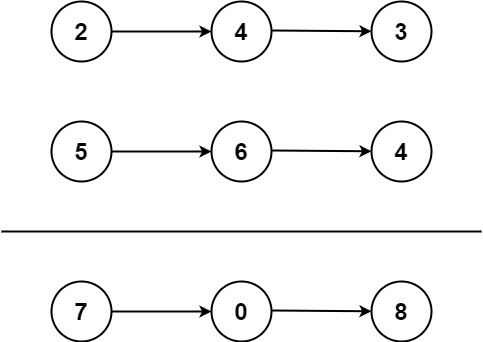LeetCode-in-All
2. Add Two Numbers
Medium
You are given two non-empty linked lists representing two non-negative integers. The digits are stored in reverse order, and each of their nodes contains a single digit. Add the two numbers and return the sum as a linked list.
You may assume the two numbers do not contain any leading zero, except the number 0 itself.
Example 1:

Input: l1 = [2,4,3], l2 = [5,6,4]
Output: [7,0,8]
Explanation: 342 + 465 = 807.
Example 2:
Input: l1 = [0], l2 = [0]
Output: [0]
Example 3:
Input: l1 = [9,9,9,9,9,9,9], l2 = [9,9,9,9]
Output: [8,9,9,9,0,0,0,1]
Constraints:
- The number of nodes in each linked list is in the range
[1, 100]. 0 <= Node.val <= 9- It is guaranteed that the list represents a number that does not have leading zeros.
Solution
/**
* Definition for singly-linked list.
* struct ListNode {
* int val;
* struct ListNode *next;
* };
*/
// Function to create a new ListNode
struct ListNode* createNode(int val) {
struct ListNode* newNode = (struct ListNode*)malloc(sizeof(struct ListNode));
newNode->val = val;
newNode->next = NULL;
return newNode;
}
struct ListNode* addTwoNumbers(struct ListNode* l1, struct ListNode* l2) {
struct ListNode dummyHead;
dummyHead.val = 0;
dummyHead.next = NULL;
struct ListNode* p = l1;
struct ListNode* q = l2;
struct ListNode* curr = &dummyHead;
int carry = 0;
while (p != NULL || q != NULL) {
int x = (p != NULL) ? p->val : 0;
int y = (q != NULL) ? q->val : 0;
int sum = carry + x + y;
carry = sum / 10;
curr->next = createNode(sum % 10);
curr = curr->next;
if (p != NULL) {
p = p->next;
}
if (q != NULL) {
q = q->next;
}
}
if (carry > 0) {
curr->next = createNode(carry);
}
return dummyHead.next;
}

